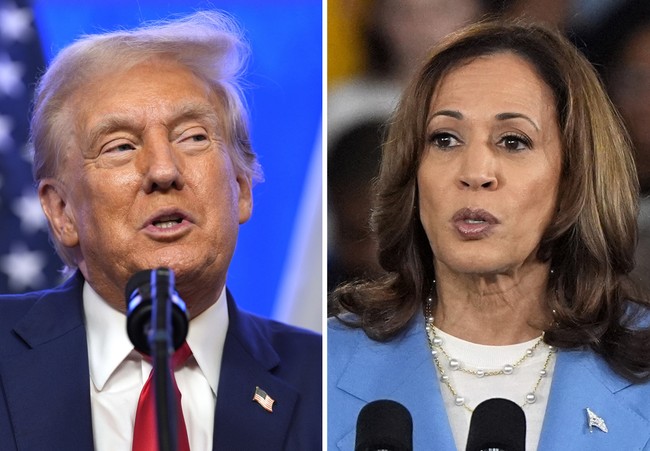
Those who are surprised by the outcome of the election must not have been paying close attention for the past four years. Listening to the public was, in fact, the deciding factor in the presidential contest, and the differing willingness to do so reflected the two parties’ current political philosophies.
For well over a year, the American people had been expressing deep concern about issues such as the economy, immigration, crime, and the government’s micromanagement of relations between the sexes, such as men competing in women’s sports. The public consistently said they did not trust the government.
The public knew very well what had caused the problems. The Biden-Harris administration had engaged in nearly four years of intensive centralization of power, with the White House exerting ever-tighter and more-politicized control over the economy, energy production, the nation’s schools, the personnel composition of the military and other institutions, crime and border control, and countless other areas of life, while conspiring with media companies to censor opposing viewpoints. Biden and Harris presided over the development of an enormous political spoils system and a forced, nationwide demographic transformation.
Other than approval of abortion and opposition to Adolf Hitler, Harris refused to tell the public what she really believes in, because the public had repeatedly told pollsters that they hold opinions directly opposite hers on nearly everything.
Out of power and not responsible for the nation’s current woes, Trump gleefully hung every problem and worry around the necks of the hapless Harris and her absurd running mate, the blundering Tim Walz. Continually contrasting the present state of things with how they were four years ago, Trump foregrounded the people’s worries and fears about inflation, immigration, crime, and other issues, addressing their concerns with expressions of sympathy and promises to “fix it.”
Trump invited the public to consider the many disasters on the Biden-Harris watch, including but by no means limited to inflation, the border crisis, rampant crime, the gender war, rising international tensions and the spending of U.S. taxpayer money on other countries’ wars, the disastrous and fatally bungled retreat from Afghanistan, increasing antisemitism, forced acceptance of experimental mRNA injections, censorship, treatment of parents as terrorists, barbaric brutalization of trespassers into the American people’s Capitol building, and the replacement of the Democrats’ lawfully chosen candidate by a flagrantly superficial, incurious, and unqualified successor chosen in secret by a small band of party insiders and intimately connected to all the disasters the government had inflicted on the American people in the past four years.
Harris’ failure in characterizing Trump as unqualified to be president was inevitable and entirely predictable in light of these disasters. The issue of qualifications highlighted the regime’s central fault—its elitism—and provided support for Trump’s claims to be the people’s champion.
These two diametrically opposed campaign strategies reflected the two parties’ approaches to government. The Democrats, the party that pushes for omnipotent government and the omnipresent micromanagement of everybody’s personal business, could not develop a plan for retaining the presidency and winning Congress other than to throw money at the problem. That paralleled the party’s approach to governance, and it worked exactly as well.
Flush with $1.2 billion in donations, more than three times as much as Trump’s $382 million, Harris and her team ignored the public’s concerns and concentrated on spiteful personal attacks on Trump.
Meanwhile, the standard bearers of the Republicans, the party that advocates private initiative, personal aspirations, innovation, smaller government, crime prevention, peace through strength, colorblindness, and respect for family, faith, and America’s history and principles (however imperfectly and sporadically the GOP may have represented these things over the years), campaigned with an appropriately looser approach. Trump indulged in jokes, insults toward powerful people, and imaginative and amusing attention-getting stunts and comments. Running mate JD Vance emulated this approach in his own more subdued style.
Swaddling Harris in bubble wrap with censorship and media favoritism had left her unprepared for the consistently innovative campaign Trump carried out with such evident glee. “As the Harris campaign begins to point fingers, it could do worse than to direct a digit at its buddies in the Fourth Estate,” opined Kimberly A. Strassel of The Wall Street Journal editorial board after the election. “Never in modern history has a media complex shilled so openly for one candidate. Yet all that did was allow the Harris campaign and elites to live in a bubble, while further eroding confidence in the media.”
It is difficult to conceive of a more absurd and ill-suited response to the chaos of the past four years and the Biden-Harris administration’s obvious responsibility for it all than for the regime’s chosen candidate to say that “There is not a thing that comes to mind” as to what she might have done differently. That moment laid bare decades of escalating incompetence and indifference toward the American people. The regime’s obvious failure to recognize and sympathize with other people’s suffering explains why Donald Trump was elected president again.
Except for Trump’s first term, presidential administrations throughout this century have concentrated more and more power in the central government and coopted big businesses to assist in ever-tighter rule by elites. The cocoon of elitism they have created has led to political campaigns no better equipped to address the voters’ concerns than they have done in their official actions when in power, which came to light vividly in the Biden-Harris administration’s countless blunders.
Trump represents a break with that trend in campaign style and, more importantly, in governing philosophy. That was what the people saw and approved of so strongly in this year’s election, and it defines Trump’s mandate to govern and what the public will expect of him.
S. T. Karnick (https://stkarnick.substack.com/) is a senior fellow at The Heartland Institute and author of the Life, Liberty, Property weekly e-newsletter.
